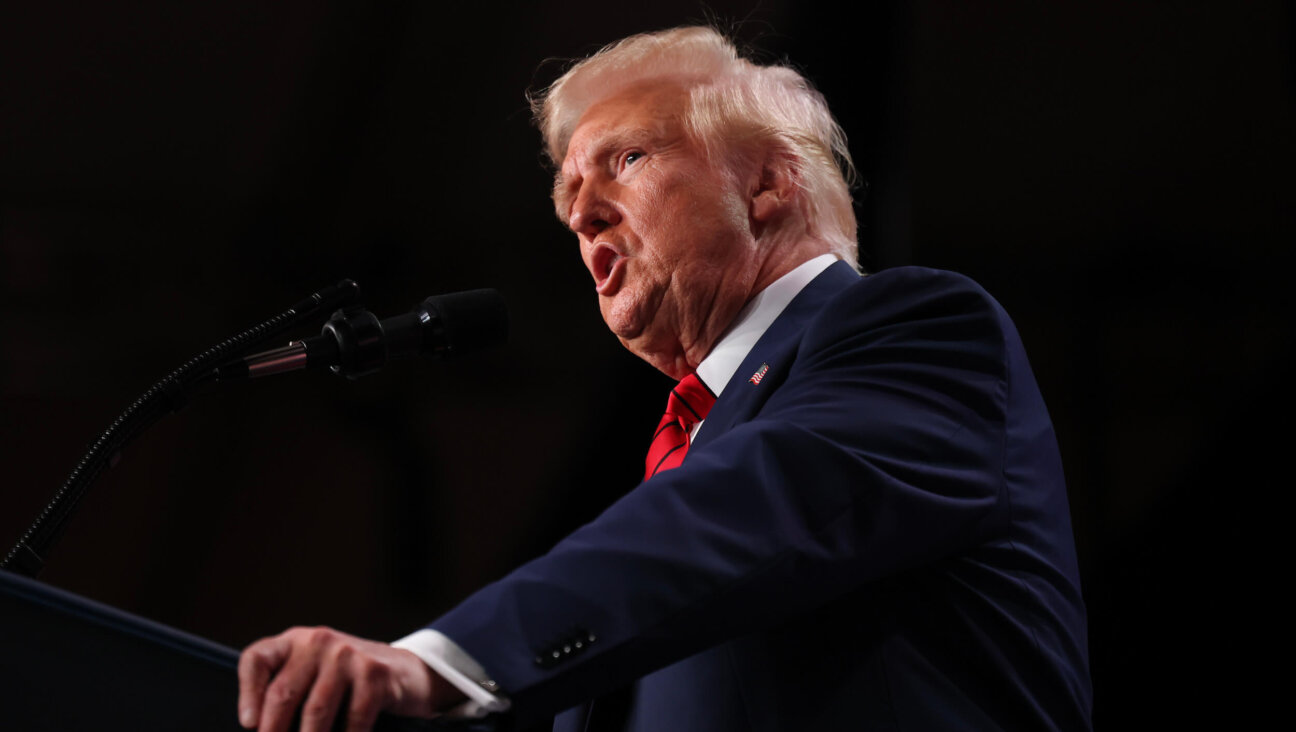American Jews must defend the two-state solution – before Democrats accept that Trump destroyed it.

US President Donald Trump shakes hands with Israeli Prime Minister Benjamin Netanyahu as they hold a meeting in the Oval Office of the White House in Washington, DC, January 27, 2020. (Photo by SAUL LOEB / AFP) (Photo by SAUL LOEB/AFP via Getty Images) Image by Getty Images
On Tuesday, the Trump administration released its long-trumpeted “deal of the century” to end the Israeli-Palestinian conflict. The plan, which can be read in full here, does what no American presidency has done before: It provides specific American terms for borders, refugees, and Jerusalem, along with other contentious issues like the status of Gaza, prisoners and hostages, all heavily weighted towards the objectives of Prime Minister Benjamin Netanyahu.

Alex Zeldin | artist: Noah Lubin
Fittingly, the plan was announced with Netanyahu at the White House, just as the news broke of his indictment in three separate cases and as Israel faces its third election in a year as a result of Netanyahu’s inability to form a governing coalition.
Already the contours laid out in the plan are taking shape in reality; Netanyahu has announced that this coming Sunday, his cabinet will vote to begin the process of applying Israeli sovereignty to the settlement blocs.
In other words, Trump and Netanyahu have taken an ax to the two-state solution. And traditional American Jewish organizations must take a leadership role in restoring the two state framework — ahead of the course correction that is certain to occur when a Democrat enters the White House.
And a course correction is coming. Trump’s treatment of the Palestinians all but dictates that it must.
Even before this peace plan, there was little reason to expect the Palestinian Authority to cooperate with the Trump administration. After all, President Trump recognized Israel’s claim to Jerusalem as its capital but not the Palestinian claim. Trump repeatedly cut off aid to the Palestinians, including to the general population for basic necessities such as food and water, even over the objections of Israel’s security establishment. The Trump administration, unhappy with the lack of Palestinian cooperation after repeated attempts to coerce it, shut down the Palestinian mission in Washington, D.C.
Given this history, there is little reason to believe that the administration’s peace plan, authored by Trump’s son-in-law Jared Kushner, had any input from Palestinian leaders on their needs, their public’s reaction, or which issues they were prepared to compromise with Israel on.
Moreover, if the plan were administered faithfully, the results would be impossible for the Palestinian Authority to implement, even if it wanted to. The plan calls for no settlers to be moved for the sake of territorial continuity. It predetermines the outcome of any possible negotiation on Palestinian refugees by declaring that Israel will take none; a more maximalist position than any Israel ever contemplated in past peace talks.
Simply put, the one thing we can be certain of with respect to Trump’s deal is that it will not end the conflict between Israel and the Palestinians. And Trump’s domestic opposition has noticed.
This plan is a unilateral imposition on the Palestinian people that is not sustainable. Security & prosperity for the Israeli & Palestinian people is in the interests of the U.S. and as Vice Chairman of @HouseForeign, I will advocate for our leadership on these issues. (3/5)
— Joaquin Castro (@JoaquinCastrotx) January 28, 2020
Congressional Democrats have already begun to voice their opposition to this approach to the Israeli-Palestinian conflict, which dispenses with a commitment to two states as well as important norms including the need for the conflict to be resolved directly between the parties.
While we cannot know who will sit in the oval office in January of 2021, we can say with certainty that the Trump administration has dispensed with an already strained bipartisan consensus towards Israel. When a Democrat returns to the White House, they will appoint new personnel and chart a new course.
Trump’s “peace plan” is a rubber stamp for annexation and offers no chance for a real Palestinian state. Releasing a plan without negotiating with Palestinians isn’t diplomacy, it’s a sham. I will oppose unilateral annexation in any form—and reverse any policy that supports it.
— Elizabeth Warren (@ewarren) January 28, 2020
The coalition politics that will help Democrats win their primaries will necessarily invite new actors in the vacuum left by the end of bipartisanship on Israel. The scale of the damage done to the American national interest by the Trump administration’s actions in the region will inform the personnel they appoint and the extent of their course correction. The longer the damage to American interests and the two state framework that America formulated continues, the more drastic the course correction will necessarily be.
And of course, the Democratic president will have to determine if the commitment to not tilt the scales towards one party or predetermine outcomes for either party is a norm that they wish to reestablish.
But there are questions we can answer going forward: Which Jewish organizations will have influence in these behind-the-scenes decisions? Will it be those who offer only their silence or mild criticisms or those who demonstrate that their commitment to a just two state solution is more than a talking point on their websites?
Today is the day where we find out who stands up to lead for two states and who can only be counted to criticize any attempt to reach a just and lasting deal.
Alex Zeldin is a contributing columnist with the Forward.
A message from our Publisher & CEO Rachel Fishman Feddersen

I hope you appreciated this article. Before you go, I’d like to ask you to please support the Forward’s award-winning, nonprofit journalism so that we can be prepared for whatever news 2025 brings.
At a time when other newsrooms are closing or cutting back, the Forward has removed its paywall and invested additional resources to report on the ground from Israel and around the U.S. on the impact of the war, rising antisemitism and polarized discourse.
Readers like you make it all possible. Support our work by becoming a Forward Member and connect with our journalism and your community.
— Rachel Fishman Feddersen, Publisher and CEO























